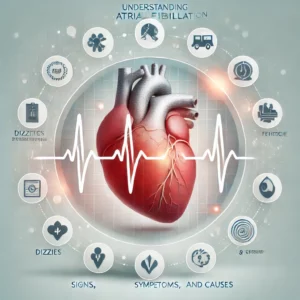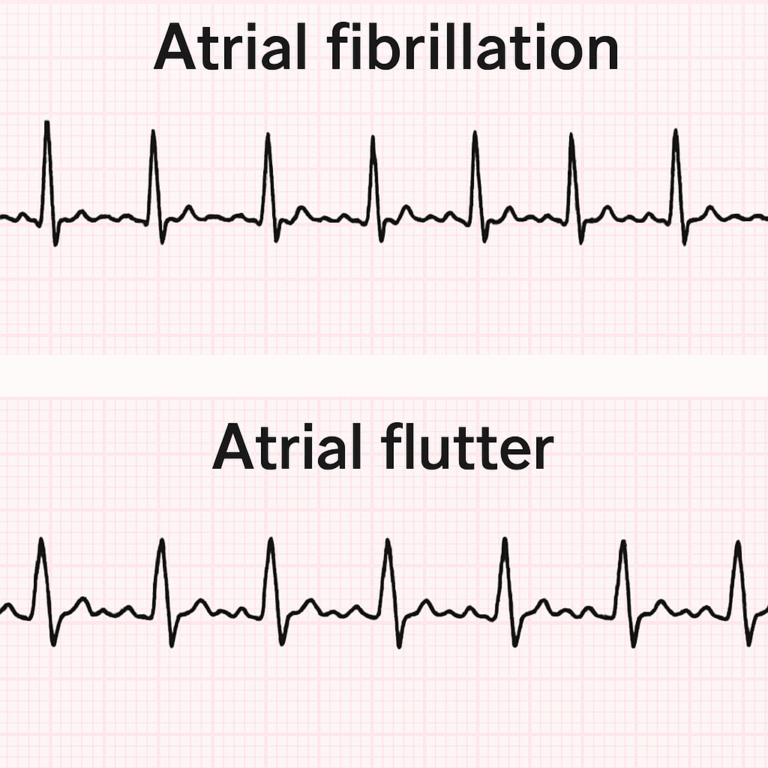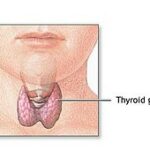Afiliate Link Disclaimer: This post contains affiliate links, meaning I may earn a small commission if you make a purchase through these links, at no additional cost to you. Your support helps keep this content free—thank you!”
Introduction;
Understanding Atrial Fibrillation: Signs, Symptoms, and Causes

Atrial fibrillation (AFib) is a common heart rhythm disorder affecting over 6 million Americans annually. AFib occurs when the heart’s electrical signals become irregular, causing rapid and uncoordinated contractions in the atria. This disruption in blood flow can lead to symptoms such as palpitations, fatigue, and dizziness. If left untreated, atrial fibrillation (AFib) significantly increases the risk of blood clots, stroke, and heart failure, making early recognition of symptoms crucial. While some individuals experience noticeable symptoms like chest pain or shortness of breath, others may remain asymptomatic, which can delay diagnosis (Cleveland Clinic, 2024).
By focusing on Proactive Solutions for Atrial Fibrillation Management, individuals can take steps to prevent complications and improve their quality of life. Early recognition of symptoms, combined with lifestyle changes and medical interventions, plays a critical role in managing this condition effectively.
The causes of atrial fibrillation (AFib) are diverse and include high blood pressure, obesity, thyroid dysfunction, and chronic stress. Lifestyle factors, such as excessive alcohol intake and untreated sleep apnea, can further exacerbate the condition. Early intervention through lifestyle changes and medical treatment is essential to mitigate risks. Recognizing the condition’s signs and understanding its causes is the first step toward improving heart health (National Heart, Lung, and Blood Institute, 2024).
Key Risk Factors and Management of Atrial Fibrillation
Age is a significant risk factor for AFib, with the condition becoming more common as individuals grow older. Other factors, including obesity, diabetes, and high cholesterol, also contribute to the likelihood of developing AFib. Women may face additional risks during pregnancy due to hormonal changes and increased blood volume, which can worsen symptoms or trigger episodes. Awareness of these risk factors is vital for early detection and prevention strategies, particularly for at-risk populations (American Heart Association, 2024).
Managing AFib involves addressing modifiable risk factors through healthy lifestyle choices. Weight loss, regular exercise, and a heart-healthy diet can significantly reduce the severity and frequency of AFib episodes. Routine laboratory screenings for cholesterol, blood pressure, and kidney function are critical in detecting underlying conditions that may increase AFib risks. (National Heart, Lung, and Blood Institute, 2024). For more guidance, explore our blog: Discover 7 Crucial Early Signs of MedicalConditions.
Get your cholesterol screening today!
Stress Management and Lifestyle Tips for Atrial Fibrillation
Stress is a well-known trigger for AFib episodes, as elevated levels of stress hormones disrupt the heart’s electrical signals. Chronic stress can increase the frequency and severity of AFib symptoms, making stress management a critical component of care. Techniques like yoga, meditation, and progressive muscle relaxation can stabilize heart rhythms and promote overall cardiovascular health. Incorporating relaxation aids such as the Organifi Sleep Support Supplement may also improve sleep quality, further supporting heart function (National Institutes of Health, 2024).
Equally important are lifestyle changes that enhance cardiovascular health, including regular physical activity and a diet rich in omega-3 fatty acids from sources like salmon and walnuts. Reducing sodium intake and prioritizing hydration are also beneficial. Together, these practices can lower blood pressure, improve circulation, and decrease the likelihood of future AFib episodes (Cleveland Clinic, 2024).
Natural Supplements and Holistic Approaches for Heart Health
Natural remedies can complement medical treatments in managing AFib. Supplements like Blood Pressure Support Supplement and magnesium or potassium are known to help regulate heart rhythms and support overall cardiovascular health. Herbal remedies, including hawthorn and valerian root, may also offer additional benefits for improving heart function and reducing stress levels. Always consult a healthcare provider before beginning any new supplement regimen to ensure safety and efficacy (American Medical Association, 2024).
Holistic practices such as acupuncture, aromatherapy, and mindfulness techniques have shown promise in reducing stress and improving circulation. These approaches, combined with a consistent exercise routine, can enhance cardiovascular health and minimize AFib episodes. By integrating these natural and holistic methods into a heart-healthy lifestyle, patients can take proactive steps toward managing AFib effectively (National Heart, Lung, and BloodInstitute, 2024).
“Take control of your heart health naturally! Order your Blood Pressure Support Supplement today!
Atrial Fibrillation During Pregnancy: Essential Care and Precautions

Pregnancy introduces unique challenges for women with AFib, as hormonal changes and increased blood volume place additional strain on the cardiovascular system. These factors can intensify symptoms such as palpitations, fatigue, and shortness of breath. Regular monitoring by both obstetricians and cardiologists is essential to ensure the safety of both the mother and baby. Maintaining a low-sodium diet and avoiding caffeine can help manage symptoms and reduce cardiovascular strain during pregnancy (American College of Obstetricians and Gynecologists, 2024).
Safe exercise routines like prenatal yoga can improve heart health and alleviate stress while supporting overall wellness. Frequent checkups and close communication with healthcare providers are critical for managing AFib during pregnancy. Refer to trusted resources like the for evidence-based care guidelines and personalized recommendations.
Hyperthyroidism and Atrial Fibrillation: Understanding the Connection
Hyperthyroidism is a significant risk factor for AFib, as elevated thyroid hormones increase heart rate and disrupt its rhythm. Overactive thyroid conditions can exacerbate arrhythmias, particularly in individuals with existing cardiovascular risk factors. Identifying and managing hyperthyroidism early is crucial to reducing the frequency of AFib episodes and preventing complications like stroke or heart failure.
Treatment options include medications to regulate thyroid function, lifestyle modifications, and regular thyroid function tests to monitor hormone levels. Combining these interventions with strategies for managing AFib ensures a comprehensive approach to heart health. For more information on thyroid and cardiovascular health, consult resources like the American Thyroid Association and the National Institutes of Health, 2024.
The Importance of Laboratory Screenings for Heart Health
Laboratory screenings play a vital role in detecting underlying conditions that increase the risk of AFib. Tests for high cholesterol, diabetes, and thyroid dysfunction provide critical insights into cardiovascular health (American HeartAssociation). Screenings for kidney function and electrolyte levels can help uncover silent issues that might contribute to arrhythmias. Early detection through regular testing allows for timely intervention and improved outcomes.
Comprehensive evaluations, such as Cardiovascular Disease and Stroke Screening, offer patients the tools they need to take control of their heart health. This proactive approach can prevent severe complications, including stroke and heart failure, while supporting overall well-being. For more information, visit the National Heart, Lung, and Blood Institute.

Breakthrough Treatments for Atrial Fibrillation
Medical advancements have introduced effective treatments for AFib that go beyond traditional medication. Catheter ablation, a minimally invasive procedure, targets and isolates areas of abnormal electrical activity in the heart. Electrical cardioversion, another option, uses controlled electric shocks to restore normal heart rhythm. These treatments provide hope for patients who do not respond to lifestyle changes or medication (American College of Cardiology, 2024).
Emerging options, including hybrid surgical approaches and next-generation antiarrhythmic drugs, continue to improve patient outcomes. When combined with healthy lifestyle practices, these treatments offer a comprehensive path to managing AFib. Patients should discuss these options with their healthcare providers to determine the best course of action (Cleveland Clinic, 2024).
Taking Proactive Steps for Heart Health
Preventing and managing AFib requires a multi-faceted approach that includes lifestyle changes, medical treatment, and ongoing education. Regular checkups and laboratory screenings help detect risk factors early, while stress management and physical activity reduce the likelihood of episodes. Staying informed about the latest treatment options empowers patients to take control of their condition.
Reliable resources such as the American Heart Association and National Institutes of Health provide evidence-based information to support heart health. Working closely with healthcare providers ensures personalized care tailored to individual needs. Taking these proactive steps is essential to reducing the impact of AFib and improving overall quality of life.Want to learn more about the early signs of medical conditions you shouldn’t ignore? Read here.
Comprehensive Care for Atrial Fibrillation: Putting It All Together
Comprehensive care for AFib involves combining medical treatments, lifestyle modifications, and regular monitoring. By addressing stress, maintaining a heart-healthy diet, and prioritizing screenings, patients can effectively manage their condition and reduce complications. Products like Lutenol for Vision Support can also complement overall health efforts.
Taking charge of your heart health starts with small, consistent changes. Regular checkups, proactive risk management, and holistic approaches ensure you remain in control of your cardiovascular health.
Frequently Asked Questions & Answers
- What is atrial fibrillation (AFib)?
Atrial fibrillation is a heart condition characterized by an irregular and often rapid heartbeat. This occurs when the upper chambers of the heart beat chaotically, affecting blood flow. If left untreated, AFib can lead to serious complications like stroke or heart failure (American Heart Association). - What are the symptoms of AFib?
Common symptoms include heart palpitations, shortness of breath, fatigue, dizziness, and chest discomfort. Some people with AFib may not experience symptoms, making regular health checkups crucial (Cleveland Clinic). - What causes AFib?
AFib is caused by various factors, including high blood pressure, hyperthyroidism, obesity, sleep apnea, and excessive alcohol use. It can also develop due to stress or underlying heart conditions (National Heart, Lung, andBlood Institute). - Who is most at risk for developing AFib?
Risk factors include advancing age, obesity, hypertension, diabetes, and a family history of heart disease. Women during pregnancy and individuals with hyperthyroidism are at higher risk as well (American Heart Association). - How can AFib be managed or treated?
Management options include medications, stress management, lifestyle changes, and minimally invasive procedures like catheter ablation. Treatments focus on restoring normal heart rhythm and reducing stroke risk (American College of Cardiology). - Can stress cause atrial fibrillation?
Yes, stress is a common trigger for AFib. High levels of stress hormones can disrupt the heart’s electrical signals. Managing stress through relaxation techniques can help minimize episodes (National Institutes of Health). - Is AFib a lifelong condition?
AFib can be a chronic condition, but some people experience it intermittently (paroxysmal AFib). With proper treatment, symptoms can often be managed effectively (Cleveland Clinic). - What lifestyle changes can help manage AFib?
Adopting a heart-healthy diet, regular exercise, reducing sodium intake, and avoiding alcohol can significantly reduce the frequency of AFib episodes. Regular checkups are also important (American Heart Association). - How does pregnancy affect AFib?
Pregnancy increases the risk of AFib due to hormonal changes and increased blood volume. Pregnant women with AFib should work closely with their healthcare providers to monitor their condition (American College of Obstetricians and Gynecologists). - What tests diagnose atrial fibrillation?
Tests like electrocardiograms (EKG), Holter monitors, echocardiograms, and blood work to check thyroid function are commonly used to diagnose AFib (Cleveland Clinic).
References
- American Heart Association. “Atrial Fibrillation Overview.” 2024, www.heart.org.
- Cleveland Clinic. “Atrial Fibrillation (AFib).” 2024, my.clevelandclinic.org.
- National Heart, Lung, and Blood Institute. “Atrial Fibrillation.” 2024, www.nhlbi.nih.gov.
- American College of Cardiology. “Management and Treatment Options for Atrial Fibrillation.” 2024, www.acc.org.
- American Thyroid Association. “Hyperthyroidism and Its Effects on the Heart.” 2024, www.thyroid.org.
- American College of Obstetricians and Gynecologists. “Cardiac Health in Pregnancy.” 2024, www.acog.org.
- JAMA Network. “Supplements and Holistic Approaches to Heart Health.” 2024, www.jamanetwork.com.
- National Institutes of Health. “Stress Management and Heart Rhythm Disorders.” 2024, www.nih.gov.
- Cleveland Clinic. “Lifestyle Adjustments for AFib Management.” 2024, my.clevelandclinic.org.
- National Heart, Lung, and Blood Institute. “Laboratory Screenings for Cardiovascular Health.” 2024, www.nhlbi.nih.gov.
Conclusion
Taking charge of your heart health with atrial fibrillation starts with awareness and proactive steps. By recognizing the signs, managing risk factors, and adopting heart-healthy habits, you can reduce complications and lead a healthier life. From stress management to breakthroughs in treatment, the tools to improve your heart health are within reach. Stay informed, prioritize regular checkups, and remember that small changes today can have a significant impact on your long-term well-being. Empower yourself to take control—your heart will thank you.
Medical Disclaimer
The information provided on this website is for informational purposes only and should not be construed as medical advice. It is not intended to replace professional medical consultation, diagnosis, or treatment. Always seek the advice of your primary care physician, nurse practitioner, or other qualified healthcare provider with any questions you may have regarding a medical condition.
Before starting any new exercise, regimen, or taking supplements, particularly if you have medical conditions or are on any prescription drugs, it is essential to consult with your primary care provider. They can help you assess whether any changes are safe and appropriate for your health status.
This article contains affiliate links. If you make a purchase through these links, I may earn a small commission at no additional cost to you. I only recommend products and services I trust.
Daily Inspiration
“The greatest wealth is health.” — Virgil

Marjorie DiCarlo, M.D., Ph.D., M.P.H.




